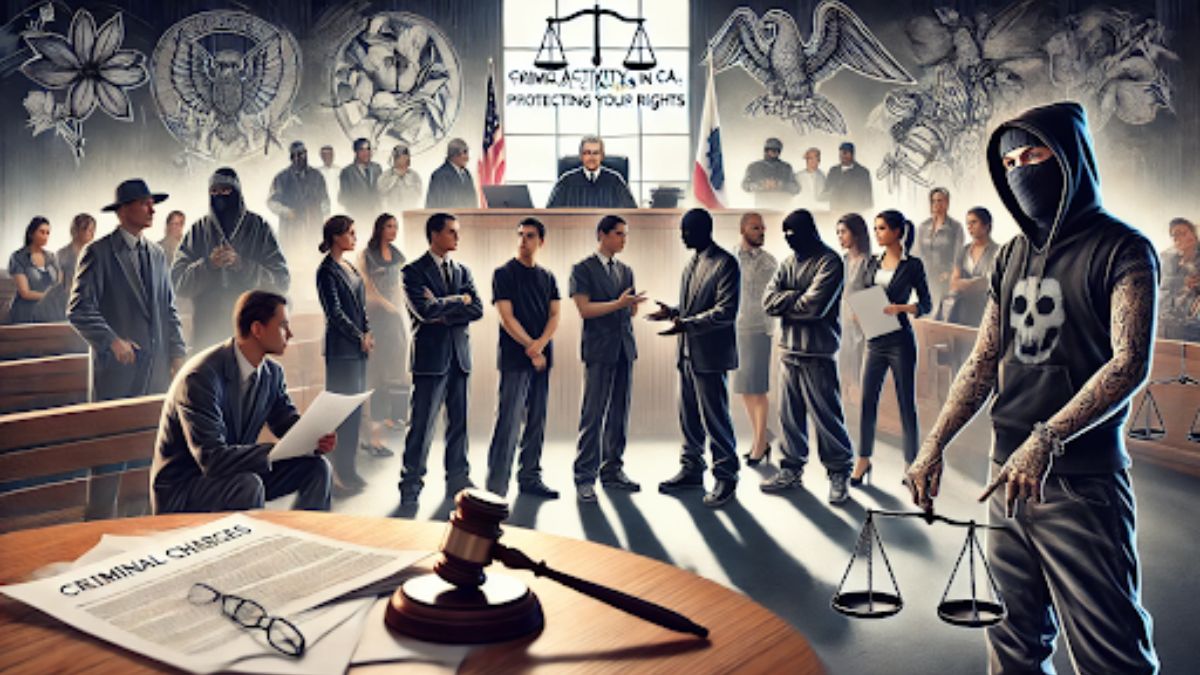LAW
Gang Activity and Criminal Charges in CA: Protecting Your Rights

Navigating the complexities of gang-related criminal charges in California requires a clear understanding of the legal landscape. In California, Penal Code § 186.22 makes it a crime to actively participate in a criminal street gang and enhances penalties for felonies committed for the gang’s benefit. This statute is designed to curb gang activities and impose stricter penalties on those involved in such criminal behavior.
For those facing charges under Penal Code § 186.22, comprehending the nuances of the law is essential to mounting a strong defense. Legal representation from knowledgeable California criminal defense lawyers can offer invaluable guidance and advocacy, protecting the accused’s rights throughout the legal process. This underscores the importance of having an experienced legal team when navigating these serious charges.
Understanding your rights and the legal framework surrounding gang-related activities is crucial. Knowing what constitutes active participation and how enhancements can influence sentencing provides a foundation for defending against these charges.
Understanding Gang-Related Criminal Behavior in California
California’s legal framework includes specific measures for addressing gang-related criminal behavior. This involves detailed definitions of gangs and gang activity, as well as significant sentencing enhancements for those involved in criminal activities associated with gangs. These legal principles heavily impact charges and sentences for individuals.
Defining Criminal Street Gangs and Activity
A criminal street gang is defined under California Penal Code 186.22. It refers to a group of three or more people with a common identifying sign, symbol, or name engaged in a pattern of criminal gang activity. Such activities include a variety of felony offenses, emphasizing violent crimes, drug-related offenses, and property crimes.
Primary activities of these gangs often include serious offenses like robbery and assault with a deadly weapon. Active participation in a gang involves demonstrating or willfully promoting criminal conduct with the gang’s goals, making even non-violent actions subject to scrutiny if they further the gang’s criminal objectives.
Sentencing Enhancements for Gang Affiliation
Under Penal Code 186.22, individuals convicted of crimes benefiting a gang face significant sentencing enhancements. These enhancements apply whether the crime is a felony or certain misdemeanors, potentially adding years to a prison sentence.
A sentencing enhancement can mean an additional two to fifteen years in prison, depending on the nature of the crime and the defendant’s role in criminal gang activity. This severe increase in penalties serves as a deterrent against gang membership and criminal activities tied to gangs. Importantly, prosecutors must prove that the crime was committed to benefit the gang.
The Impact of Gang Activity on Charges and Sentences
Gang affiliation heavily influences the charges and penalties an individual faces. Engaging in a pattern of criminal gang activity can turn a minor offense into a major one due to the gang’s involvement. Gang enhancements are applied on top of the base sentence, escalating the punishment significantly.
For instance, a felony linked to gang activity might result in state prison instead of county jail. This not only extends the incarceration period but also affects parole eligibility and rehabilitative opportunities. Legal representation must focus on challenging the gang enhancement and proving that the activity was not for the gang’s benefit, to minimize these severe consequences.
Protecting Your Rights: Legal Defenses and Steps to Take
When facing gang-related criminal charges in California, understanding your legal defenses and steps to protect your rights is crucial. Effective defense strategies and knowing your rights within the justice system can significantly impact the outcome of your case.
Strategies for Defending Against Gang-Related Charges
Challenging the Evidence: A critical defense strategy involves scrutinizing the evidence presented. This includes questioning the validity of witness testimony, physical evidence, and any statements made by the defendant. The goal is to create reasonable doubt about the defendant’s participation in the alleged criminal activities.
Disproving Gang Association: Another common defense is to dispute the defendant’s involvement or association with a criminal street gang. Demonstrating a lack of intent or direction to participate in gang-related activities can weaken the prosecution’s case.
Affirmative Defenses: In cases involving violent crimes or severe charges like murder or arson, the defense may assert self-defense, duress, or entrapment. For example, in a self-defense claim, the defendant argues that they acted to protect themselves from immediate harm.
Rights of the Accused and the Role of the Justice System
Right to a Fair Trial: Every defendant has the right to a fair trial, including the presumption of innocence until proven guilty. This entails a jury of peers, an impartial judge, and the opportunity to present a full defense.
Right to Legal Representation: Defendants are entitled to a defense by a criminal defense attorney. An experienced attorney can navigate complex legal frameworks like the Street Terrorism Enforcement and Prevention Act and negotiate on behalf of the defendant.
Protection Against Self-Incrimination: Under the Fifth Amendment, defendants cannot be forced to testify against themselves. This right protects them from making potentially self-damaging statements under pressure.
Access to Evidence: Defendants have the right to access all evidence that the prosecution plans to use in court. This transparency allows the defense to prepare adequately and identify any inconsistencies or errors.
By leveraging these strategies and rights, individuals facing gang-related charges can mount a robust defense, ensuring that justice is fairly served.
In Conclusion
Understanding the implications of gang enhancement laws in California is crucial for anyone facing criminal charges related to gang activity. These laws, such as those outlined in the California Street Terrorism Enforcement and Prevention Act (STEP Act), carry severe penalties.
Prosecutors must prove several elements to apply a gang enhancement. The defendant must have:
- Actively participated in a criminal street gang
- Known that the gang’s members engaged in ongoing criminal activity
- Willfully assisted or promoted felonious criminal conduct
The penalties for gang enhancements can be severe. Under Penal Code 186.22(a), charges can be classified as either felonies or misdemeanors. A misdemeanor conviction can result in up to one year in county jail or a fine of up to $1,000. A felony conviction can lead to more extended prison sentences.
Legal defenses against gang enhancement charges require a thorough examination of the case facts. Possible defenses include proving a lack of knowledge about the gang’s activities or demonstrating that the defendant did not actively participate in the gang.
Ensuring the protection of individual rights under these circumstances involves seeking expert legal advice. Knowledgeable legal professionals can dissect the case against the backdrop of these complex laws to provide a robust defense strategy.
Individuals facing such charges should be aware of their rights and the legal intricacies involved. This awareness is the first step towards defending against potential severe consequences under California’s gang enhancement statutes.
LAW
Why You Should Hire a Fairfax Criminal Defense Lawyer for Juvenile Cases

When it comes to juvenile criminal cases, the stakes are high. For parents or guardians, seeing a child face criminal charges can be overwhelming, and the legal process might feel intimidating. That is why hiring an experienced Fairfax criminal defense lawyer is crucial. Suppose you deal with legal matters in Fairfax or nearby areas like Leesburg. In that case, it’s also essential to consider the assistance of a Leesburg criminal defense lawyer.
Juvenile cases require special attention because the legal system focuses on rehabilitation rather than punishment. A Fairfax or Leesburg criminal defense lawyer specializing in juvenile cases can navigate the court’s complexities and advocate for the best possible outcome for the child. Without proper legal representation, a young person’s future could be significantly impacted by a criminal record, even in cases involving minor offenses.
Understanding the Juvenile Justice System
The juvenile justice system is designed to be distinct from the adult criminal system, focusing more on rehabilitation and less on punishment. The idea is to help young offenders correct their behavior rather than condemn them to a life of crime. However, navigating this system requires a deep understanding of its intricacies, so hiring a criminal defense lawyer in Fairfax or Leesburg is critical.
Juvenile cases can include a range of offenses, from minor infractions like shoplifting to more serious crimes like assault or drug possession.
A qualified Fairfax criminal defense lawyer can help ensure that your child’s case is handled appropriately and that they are treated fairly throughout the process. They can also work to keep the case in juvenile court rather than allowing it to escalate to adult court, where penalties are often harsher.
Why Hire a Criminal Defense Lawyer for Juvenile Cases?
- Expert Knowledge of Juvenile Law: Juvenile law is complex and distinct from adult criminal law. Not all lawyers are equipped to handle the nuances involved in these cases. A seasoned criminal defense lawyer in Fairfax or Leesburg understands the laws specific to juvenile cases, as well as the procedures and tendencies of local courts.
- Focus on Rehabilitation, Not Punishment: The juvenile justice system focuses on helping young offenders improve their behavior instead of punishing them. A good defense lawyer will work to ensure that the court focuses on rehabilitation options such as counseling, community service, or diversion programs rather than imposing harsh penalties. They can negotiate with the court to reduce charges or avoid detention in a juvenile facility, helping the child get the support they need to reform their behavior.
- Protection of the Child’s Rights: Many people, especially minors, may need to understand their rights within the legal system fully. An experienced Leesburg criminal defense lawyer or Fairfax criminal defense lawyer will protect the child’s rights throughout the legal proceedings. It includes protecting them from coercive interrogation tactics, ensuring fair treatment, and preventing any violations of their legal rights that could compromise their case.
- Reducing Long-Term Consequences: Even though juvenile records are often sealed or expunged, a criminal charge can have long-term consequences for a young person. It could affect their ability to get into college, secure a job, or qualify for scholarships and loans. In some cases, they may be able to get the case dismissed entirely.
- Avoiding Transfer to Adult Court: One of the most significant risks in juvenile cases is the possibility of the child being transferred to adult court. If this happens, the penalties can be far more severe, and the child could face prison time. A qualified Fairfax criminal defense lawyer can fight to keep the case in juvenile court, where the focus remains on rehabilitation. In Virginia, courts can try minors as adults for certain serious crimes. Still, a skilled lawyer can present arguments to prevent this transfer.
The Benefits of Local Knowledge
Hiring a local criminal defense lawyer in Fairfax or Leesburg provides a significant advantage. These lawyers are familiar with the local courts, judges, and prosecutors, which means they can better predict how a case might unfold. They can also leverage their local connections to negotiate more favorable outcomes.
For example, a Fairfax criminal defense lawyer who regularly handles juvenile cases in Fairfax courts will know the tendencies of specific judges regarding sentencing or rehabilitation programs.
Personalized Attention and Compassion
Juvenile cases often involve highly emotional and stressful circumstances for both the child and their family. A good defense lawyer doesn’t just focus on the legal aspects of the case; they also provide emotional support and guidance throughout the process. A compassionate Fairfax criminal defense lawyer will listen to your concerns and answer your questions.
Parents may feel helpless and unsure of what steps to take next when their child faces criminal charges. Having a lawyer who takes the time to explain the legal process and provides reassurance can make a world of difference.
Conclusion
Juvenile criminal cases require specialized legal representation, and hiring a Fairfax criminal defense lawyer or a Leesburg criminal defense lawyer can make all the difference in your child’s case. These lawyers know the local laws and how to handle the juvenile justice system, ensuring the child’s rights are protected, and the court focuses on helping them improve. Hiring a qualified lawyer safeguards your child’s immediate future. It helps them avoid long-term consequences that could impact their lives.
LAW
Motorcycle Accident Law: Key Things You Should Know

Motorcycle enthusiasts in Colorado revel in the state’s expansive landscapes and vast network of scenic roads that make it an ideal place for riding. However, the thrill of motorcycling in such an environment comes with significant risks, and accidents can happen, often with serious consequences. Understanding the intricacies of motorcycle accident law in Colorado is crucial for every rider. Whether you’re navigating the bustling streets of Denver or cruising through the winding roads of the Rockies, knowing your legal rights and how to protect yourself can make all the difference in the event of an accident.
Determining Fault in Motorcycle Accidents
Determining who is at fault in a motorcycle accident is crucial as it influences the outcome of legal claims and compensation. Fault is typically established through the collection of evidence, including police reports, witness statements, and traffic surveillance footage. In some cases, fault may be shared between parties, known as comparative negligence, which can affect the amount of compensation each party receives. Motorcyclists should gather as much evidence as possible immediately after an accident, as this information will be vital in building a strong legal case or defense.
Understanding Motorcycle Accident Law
Motorcycle accident law covers the legal rules and procedures that apply when a motorcycle accident occurs. This law aims to determine who is at fault, assess damages, and award compensation to those injured. In cases where the legalities become complex, assistance from a motorcycle injury law firm in Denver can be invaluable. These firms specialize in understanding local laws and can help victims navigate the claims process to ensure they receive the compensation they deserve. They also provide representation in court if the claim escalates into a legal dispute.
Common Causes of Motorcycle Accidents
The causes of motorcycle accidents can vary widely, but some common factors include driver negligence, such as speeding or distracted driving, and environmental conditions like slippery roads or poor visibility. Other drivers’ failure to see motorcycles due to their smaller size also frequently contributes to accidents. Legally, these factors play a crucial role as they help establish fault or liability in a crash. Understanding these common causes can help motorcyclists be more vigilant and potentially prevent accidents before they occur.
The Role of Insurance
Insurance plays a pivotal role in dealing with the aftermath of a motorcycle accident. Motorcyclists should have a clear understanding of their insurance policy’s coverage, including what damages it covers and any limitations or exclusions that may apply. Dealing with insurance companies can be challenging, often requiring careful negotiation to get the rightful compensation. Riders should document all communications with their insurance provider and consider seeking legal advice to ensure their rights are fully protected and to facilitate the claims process.
Legal Rights of Motorcyclists
Motorcyclists have specific legal rights that protect them before, during, and after an accident. These rights ensure they can claim compensation for injuries and damages if they are not at fault. They also provide protection against unfair practices by insurance companies and other parties involved in the accident. It is important for riders to know these rights thoroughly to defend themselves effectively in any legal battles and to secure fair treatment and compensation. Educating oneself about these rights can significantly impact the outcomes of legal proceedings and insurance claims.
Compensation for Motorcycle Accidents
Understanding the types of compensation available after a motorcycle accident is crucial for any rider. Victims may be entitled to recover costs for medical expenses, lost wages due to time away from work, and compensation for pain and suffering. In some cases, if the injury leads to long-term disability, compensation might also cover ongoing rehabilitation costs and modifications needed for a changed lifestyle. Knowing what can be claimed and how to document these expenses is vital for ensuring that you receive full compensation. It’s important to work with knowledgeable attorneys who can help accurately assess and demand appropriate compensation for all damages.
Steps to Take After a Motorcycle Accident
The steps taken immediately following a motorcycle accident can significantly impact the outcome of legal and insurance claims. First and foremost, ensure safety at the scene: move to a safe area, check for injuries, and call emergency services. It is crucial to document the accident scene with photos and gather contact information from witnesses. Filing a police report and notifying your insurance company as soon as possible are also key actions. Having a structured approach to handling the aftermath of an accident can streamline the process of filing for compensation.
Choosing the Right Attorney
Selecting the right attorney is essential for navigating the complexities of motorcycle accident law. Look for a lawyer who specializes in motorcycle accidents as they will have specific knowledge and experience that can greatly benefit your case. During initial consultations, assess the attorney’s understanding of local laws, their approach to handling cases, and their track record of success in similar cases. A competent attorney will not only offer legal guidance but also advocate on your behalf, striving to secure the best possible outcome for your situation.
Preventing Motorcycle Accidents
Prevention is always better than cure, especially when it comes to motorcycle accidents. Riders can take proactive steps to reduce the risk of accidents by maintaining their motorcycles in good working order, wearing appropriate safety gear, and adhering to road safety laws. Continuous education about safe riding practices and staying updated on new laws can also help reduce accident risks. Participating in defensive riding courses can enhance riding skills and strategies for avoiding accidents.
Legal Trends and Recent Case Studies
Staying informed about recent legal trends and case studies related to motorcycle accidents can provide valuable insights for riders. Understanding how similar cases have been handled in the courts can inform your decisions regarding your own case. It also helps in understanding how legal standards and interpretations are evolving, which can directly impact your rights as a motorcyclist.
Motorcycle riding in Colorado comes with its share of risks, but with the right knowledge and preparation, riders can protect themselves legally and financially. From knowing how to handle the immediate aftermath of an accident to choosing the right legal representation and understanding your compensation rights, being well-prepared can make a significant difference. Stay informed, stay safe, and ensure you have the necessary legal knowledge to protect your interests in the event of an accident.
LAW
Empowering Consumers: A Guide to Effective Pharmaceutical Research

In today’s healthcare landscape, being an informed consumer is more important than ever. With countless pharmaceuticals available, consumers often find it overwhelming to determine which medications are both safe and effective. The rise of misinformation can lead to dangerous health decisions, impacting individual health and undermining public trust in the healthcare system. It is crucial for consumers to take the initiative to research and understand the products they are using. By doing so, they can make informed choices that not only protect their well-being but also empower them to engage in meaningful conversations with healthcare providers. Ultimately, an educated consumer contributes to a more transparent and accountable healthcare environment.
Misinformation can take many forms, from exaggerated marketing claims to misleading testimonials. This prevalence underscores the necessity for consumers to critically evaluate pharmaceutical products and the claims surrounding them. A well-informed consumer is better equipped to navigate the complexities of medications, leading to healthier choices and improved health outcomes. Additionally, understanding the sources of information—whether peer-reviewed studies or anecdotal experiences—can further enhance a consumer’s ability to discern fact from fiction. Therefore, mastering effective research techniques is essential for anyone looking to manage their health wisely and make choices that align with their personal health goals.
Understanding Pharmaceutical Claims
Pharmaceutical claims refer to the statements made by drug manufacturers regarding the effectiveness and safety of their products. These claims can range dramatically, from assertions of immediate relief to promises of long-term health benefits. While some claims are firmly rooted in scientific research, others may be misleading or exaggerated, aimed primarily at attracting consumers. Understanding the nature of these claims is crucial, as they can significantly influence your healthcare decisions and impact your overall health journey. By becoming familiar with the terminology and regulatory standards, consumers can better navigate the often complex landscape of pharmaceutical marketing, leading to more confident and informed choices.
Recognizing the difference between legitimate claims and misleading information is vital for making informed decisions. Legitimate claims are typically backed by rigorous clinical trials and peer-reviewed studies, while misleading claims often depend on anecdotal evidence or lack substantial scientific support. By scrutinizing these claims, consumers can make better choices about which medications to trust and use. This careful examination not only enhances individual health outcomes but also fosters a culture that prioritizes transparency and honesty in healthcare. Empowered consumers can challenge misleading practices and advocate for higher standards in pharmaceutical marketing, ultimately leading to a more informed public that demands accountability from the industry.
Where to Begin Your Research on Pharmaceuticals
Starting your research can seem overwhelming, but there are reputable sources available to guide you. One of the best places to begin is the FDA website, which provides detailed information about approved medications, including their intended uses, side effects, and clinical trial results. This official resource also offers updates on drug recalls and safety warnings, ensuring you stay informed about potential risks. Peer-reviewed medical journals are another excellent resource, as they contain studies that assess the effectiveness and safety of various pharmaceuticals. By examining these studies, you can gain a deeper understanding of how medications perform in real-world settings. Trusted health organizations also publish valuable information that can help consumers make informed decisions about their medications, often breaking down complex medical jargon into understandable terms for the general public.
If you encounter any suspicious claims during your research, consulting with a Washington DC whistleblower attorney can be beneficial. These legal experts can provide insights into potential fraud and guide you on how to approach your concerns. Their expertise can be particularly valuable in understanding the legal implications of reporting unethical practices. Understanding your legal options can empower you to take action if you suspect wrongdoing, further enhancing your ability to protect your health. Additionally, knowing the right channels for reporting can help ensure your concerns are taken seriously. Taking proactive steps can not only safeguard your health but also contribute to a broader effort to maintain integrity in the pharmaceutical industry.
Recognizing Red Flags in Pharmaceutical Marketing
When evaluating pharmaceutical products, being aware of common red flags is essential. One significant warning sign is overly aggressive marketing tactics. If a product is marketed with extreme enthusiasm or promises that seem too good to be true, it may not be reliable. Additionally, claims lacking scientific backing are often a cause for concern. Advertisements that use flashy slogans or emotional appeals instead of factual evidence should be approached with caution. Taking the time to investigate the claims can prevent costly and potentially harmful health decisions. Always remember that skepticism can be a healthy part of making informed choices, allowing you to navigate the pharmaceutical landscape more effectively.
Another red flag to watch for is the presence of testimonials without credible sources. While personal stories can be compelling, they do not replace rigorous scientific research. Testimonials can often be cherry-picked to highlight only the most favorable outcomes, leaving out negative experiences. If you suspect that a pharmaceutical product is making misleading claims, it is vital to take action. You can report respiratory fraud and other dubious practices to the relevant authorities. By doing so, you ensure that your concerns are addressed and contribute to a safer healthcare environment. Your vigilance can help protect not only your own health but also that of others in your community, fostering a more informed public discourse about medication safety.
Engaging with Healthcare Professionals
Interacting with your healthcare provider is a vital step in taking control of your health. When discussing medications or treatments, it’s important to ask questions. Inquire about the effectiveness of a prescribed drug, potential side effects, and any alternative options that might be available. Don’t hesitate to bring up any personal health concerns that could affect your treatment plan. Understanding the rationale behind a specific medication can also enhance your comfort and compliance with the prescribed regimen. Remember, your health is a partnership, and open communication fosters a better relationship with your provider. By being proactive, you can work together to create a tailored healthcare strategy that best meets your needs.
Additionally, don’t hesitate to voice any concerns you have about pharmaceutical claims. Healthcare providers often stay updated on the latest research and can help you navigate complex information. They can clarify any misconceptions and provide context to the claims you may encounter in advertisements. Engaging in a dialogue about your concerns can also lead to more personalized care, as providers may consider your unique perspective and experiences. If they suspect any fraudulent activities related to a medication or treatment, they may suggest seeking further legal advice. Being vigilant about these issues not only protects your health but also contributes to broader efforts to ensure patient safety and ethical practices within the healthcare system. This proactive approach ensures you are well-informed and supported in your healthcare decisions.
Utilizing Online Tools and Resources
In today’s digital age, numerous online tools and resources can help consumers verify pharmaceutical information. Drug interaction checkers are particularly useful for understanding how different medications may affect each other, helping you make informed decisions about your prescriptions. Additionally, online pharmacy reviews can provide insights into the reliability and safety of various pharmacies, allowing you to choose wisely where to obtain your medications. By cross-referencing multiple sources, you can gain a comprehensive view of the medications you’re considering. This thorough approach can significantly reduce the risk of adverse effects and enhance your overall health management. Staying informed also fosters a proactive attitude toward your health, encouraging open dialogue with your healthcare provider.
Patient forums and support groups also serve as excellent resources for gathering information about medications and treatments. Hearing from others who have had similar experiences can offer valuable perspectives. If you encounter fraudulent claims while using these online resources, remember that you can consult a whistleblower law firm for advice. They can help you navigate the process of reporting any concerns you may have, ensuring that your actions contribute to a safer healthcare environment. Engaging in these communities not only provides support but can also empower you to advocate for better practices within the pharmaceutical industry. By sharing your experiences, you can help others make more informed choices as well. This sense of community can foster a deeper understanding of treatment options and encourage collective efforts for change.
Final Thoughts
Empowering consumers through effective research is essential in today’s complex healthcare landscape. By understanding pharmaceutical claims, utilizing trusted resources, recognizing red flags, engaging with healthcare professionals, and leveraging online tools, you can make informed decisions about your health. Taking an active role in your health choices not only benefits you but also contributes to a culture that values transparency and accountability in the pharmaceutical industry. This proactive stance can also inspire others to educate themselves, creating a ripple effect of informed consumers who demand better practices. Ultimately, the more knowledge you acquire, the better equipped you are to navigate potential challenges and advocate for your needs.
As you navigate your health journey, remain vigilant about the information you encounter. By sharing your findings with friends and family, you can help raise awareness about the importance of informed decision-making. Remember, your health is your own, and being well-informed is one of the best tools you have to ensure it remains positive. Always advocate for your well-being and do not hesitate to seek help or report any suspicious activities you may observe in the pharmaceutical landscape. Your commitment to vigilance can foster a community of support, where individuals empower one another to seek truth and clarity in their healthcare choices. This collaborative effort not only strengthens personal health but also enhances the overall integrity of the healthcare system.
-

 HEALTH5 months ago
HEALTH5 months agoIntegrating Semaglutide into Your Weight Loss Plan: A Practical Guide
-

 HOME IMPROVEMENT5 months ago
HOME IMPROVEMENT5 months agoHow to Choose the Perfect Neutral Area Rug for Every Room
-

 ENTERTAINMENT1 month ago
ENTERTAINMENT1 month agoInside a Coomer Party: A Closer Look at this Growing Trend
-

 CONSTRUCTION4 months ago
CONSTRUCTION4 months agoConstruction Site Safety Regulations in New York and Your Rights as a Worker
-

 LAW4 months ago
LAW4 months agoTeenage Drivers and Car Accidents in California: Risks and Parental Liability
-

 FASHION5 months ago
FASHION5 months ago7 Celebrity-Inspired Elegant Summer Dresses For 2024
-

 LAW4 months ago
LAW4 months agoKentucky’s School Football: Concussions, Injuries, and Legal Options
-

 LAW4 months ago
LAW4 months agoPost-Divorce Considerations in California: Modifications and Long-Term Planning
